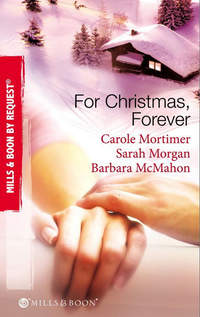
Полная версия
One Summer In Paris

SARAH MORGAN lives near London with her husband and two sons. An international bestseller, her books have been translated into more than thirty languages and she has sold over sixteen million copies. For more about Sarah visit her website www.sarahmorgan.com, and sign up to her newsletter. She loves to connect with readers on Facebook (www.facebook.com/AuthorSarahMorgan), Twitter (@SarahMorgan_) and Instagram (sarahmorganwrites).
Also by Sarah Morgan
How to Keep a Secret
The Christmas Sisters
From Manhattan with Love
Moonlight Over Manhattan
Holiday in the Hamptons
New York, Actually
Miracle on 5th Avenue
Sunset in Central Park
Sleepless in Manhattan
Puffin Island
One Enchanted Moment
Some Kind of Wonderful
First Time in Forever
The O’Neil Brothers
Maybe This Christmas
Suddenly Last Summer
Sleigh Bells in the Snow

Copyright

An imprint of HarperCollins Publishers Ltd
1 London Bridge Street
London SE1 9GF
First published in Great Britain by HQ in 2019
Copyright © Sarah Morgan 2019
Sarah Morgan asserts the moral right to be identified as the author of this work.
A catalogue record for this book is available from the British Library.
This novel is entirely a work of fiction. The names, characters and incidents portrayed in it are the work of the author’s imagination. Any resemblance to actual persons, living or dead, events or localities is entirely coincidental.
All rights reserved under International and Pan-American Copyright Conventions. By payment of the required fees, you have been granted the non-exclusive, non-transferable right to access and read the text of this e-book on-screen. No part of this text may be reproduced, transmitted, downloaded, decompiled, reverse engineered, or stored in or introduced into any information storage and retrieval system, in any form or by any means, whether electronic or mechanical, now known or hereinafter invented, without the express written permission of HarperCollins.
Ebook Edition © April 2019 ISBN: 9781474070713
Dear Reader,
If you’ve read my books before (thank you! And if you haven’t, welcome) then you’ll know I often explore themes of friendship in my stories. If we’re lucky we continue to make friends throughout the course of our lives, finding like-minded people in many different places. Our friendship circle more often than not includes people of our own generation, but sometimes we find ourselves with older and younger friends.
For years I enjoyed a friendship with my elderly neighbour, who often shared stories of her life during the war. (When a bomb dropped on the railway line, she jumped off the train and walked the rest of the way into London, refusing to alter her plans. Obviously, I was never able to complain about train delays again.) Our age difference, close to six decades, was never a barrier to conversation. If anything, it made the friendship richer and deeper. Intergenerational friendships bring with them a broader perspective and that was something I was keen to explore in this story.
Grace is in her forties and Audrey is a teenager. They meet by accident at a point in their lives when each of them is struggling and they form a friendship that is both unexpected and life-changing. I loved writing about these characters and discovering what each could offer the other.
If you’re a member of a book group, or talk about your reading with friends - and if you don’t, but you’d like to, you’re always welcome on my Facebook page where we all frequently chat about which books we’re reading and loving - you’ll find plenty of other interesting themes to discuss in this book.
If what you really want is to escape for a few hours into a story that makes you laugh and cry (but in a good way, I promise!), while making you feel as if you’ve had a summer break in Paris, then I hope you’ll find that too.
Happy Reading
Sarah
xxx
For Susan Swinwood,with love and thanks.
“The real voyage of discovery consists not in seeking new landscapes, but in having new eyes.”
MARCEL PROUST
Contents
Cover
About the Author
Booklist
Title Page
Copyright
Dear Reader
Dedication
Epigraph
Grace
Audrey
Grace
Audrey
Grace
Mimi
Paris
Audrey
Grace
Audrey
Grace
Audrey
Grace
Mimi
Audrey
Grace
Audrey
Grace
Audrey
Grace
Mimi
Grace
Audrey
Grace
Audrey
Grace
Mimi
Grace
Acknowledgments
Excerpt
About the Publisher
Grace
Grace Porter woke on Valentine’s Day, happily married and blissfully unaware that was about to change.
Downstairs in the kitchen she added slices of cheese to the bread she’d baked fresh the day before, put fruit and raw vegetables into lunch boxes and then checked her list.
Number four on today’s list: remind Sophie about dinner.
She glanced up. “Don’t forget Dad and I are out tonight. Your dinner is in the fridge.”
Her daughter, Sophie, was messaging a friend. “Mmm…”
“Sophie!”
“I know! No phones at the table—but this is urgent. Amy and I are writing a letter to the paper about that development they’re going to build on the edge of town. Dad promised he’d publish it. Can you believe they want to close the dog shelter? Those dogs are going to die if someone doesn’t do something, and that someone is me. There. Done.” Sophie finally looked up. “Mom, I can make my own lunch.”
“Would you include fresh fruit and veg?”
“No. Which is why I’d rather make my own.” Sophie gave a smile that didn’t just light her up, it lit Grace up, too. “And you’re starting to sound like Monica, which is a little scary.”
Her daughter was like sunshine. She made the world a brighter place. For years Grace had been braced for her to rebel, take drugs, or roll in drunk after an illicit party with friends, but it hadn’t happened. It seemed that Sophie’s genetic makeup favored David’s side of the family, which was a relief. If Sophie had an addiction it was causes. She hated injustice, inequality and anything she deemed unfair—particularly when it related to animals. She was the champion of all dogs, especially the underdog.
Grace was quick to defend her friend. “Monica is a wonderful mother.”
“Maybe, but I can tell you that the first thing Chrissie is going to do when we get to Europe this summer is feast on a ton of fries to make up for all the years her mom wouldn’t let her touch them.” Sophie finished her oatmeal. “Did you say something about dinner?”
“Have you forgotten what day it is?” Grace closed the lunch boxes and put one next to Sophie. The other she slid into her own bag.
“Valentine’s Day.” Sophie slid off her chair and picked up her empty bowl. “The day it becomes public knowledge that nobody loves me.”
“Dad and I love you.”
“No offense, but you’re not young, cool and athletic.”
Grace took a mouthful of coffee. How much should she say? “It’s still Sam?”
Sophie’s smile faded as if someone had hit the dimmer switch. “He’s seeing Callie. They walk around together holding hands. She keeps giving me these smug smiles. I’ve known Callie since I was three, so I don’t understand why she’s doing this. I mean, date him, sure. That sucks, but it’s life. But it’s like she’s trying to hurt me.”
Grace felt a burning in her chest. Not heartburn, but parenthood. As a mother, her role was to support from the sidelines. It was like being forced to watch a really bad play without the consolation of knowing you could leave in the interval.
“I’m sorry, honey.”
“Don’t be.” Sophie put her bowl in the dishwasher and then added the one her father had left on the side. “It would never have worked out. Sophie and Sam sounds pretty lame, don’t you think?”
Her hurt slid into Grace and settled deep in her gut.
“You’re going to college soon. After a month in California you won’t even remember Sam exists. You have your whole life ahead of you, and all the time in the world to meet someone special.”
“I’m going to study, graduate top of my class and go to law school where I can learn how to sue people who are assho—”
“Sophie!”
“Er…not very nice people.” Sophie grinned, slung her backpack over one shoulder and stroked her long ponytail over the other. “Don’t worry, Mom. Boys drive me insane. I don’t want a relationship.”
That will change, Grace thought.
“Have a great day, Mom, and happy anniversary. Twenty-five years of not yelling at Dad when he leaves his socks on the floor and his dirty plate on top of the dishwasher. Major achievement. Are you seeing Mimi today?”
“This afternoon.” Grace slid her laptop into her bag. “I made macarons, like the ones she used to buy in Paris. You know what a sweet tooth your great-grandmother has.”
“Because she lived in Paris during the war and she had no food. Sometimes she was too weak to dance. Can you even imagine that?”
“That’s probably why she talks to you about it. She doesn’t want you to take things for granted.” She opened the box she’d carefully packed that morning, revealing pastel macarons lined up in neat rows of rainbow perfection.
Sophie made a sound that was almost a purr. “Wow. I don’t suppose I could…?”
“No.” Grace closed the box. “But I might have packed a couple for your lunch.” She tried not to think about the sugar, or how Monica would react to the inclusion of empty calories in a lunch box.
“You’re the best, Mom.” Sophie kissed her cheek and Grace felt warmth flood through her.
“Do you need a favor or something?”
“Don’t be cynical.” Sophie grabbed her coat. “Not many people would teach French at an assisted-living center, that’s all. I think you’re amazing.”
Grace felt like a fraud. She didn’t do it out of any sense of charity, but because she liked the people. They were always so pleased to see her. They made her feel valued.
It was embarrassing to think she could still be needy at her age.
“Their French Club is the best part of my week. Today being Valentine’s Day, I’ve allowed myself to be creative.” She picked up the stack of menus she’d designed. “The staff are laying the tables in the restaurant with red-and-white tablecloths. We’re eating French food, I’m playing music… Knowing your great-grandmother, there will be dancing. What do you think?”
“Ooh là là, I think it sounds great.” Sophie grinned. “Just remember that the average age of Mimi’s friends is ninety. Don’t give them all heart attacks.”
“I’m pretty sure Robert has his eye on Mimi.”
“Mimi is a minx. I hope I’m like her when I’m ninety. She has this wicked twinkle in her eye… It must have been fun having her living with you when you were growing up.”
It had been lifesaving. And that, of course, was why Mimi had moved in.
It was a time she’d never discussed with her daughter. “She’s one in a million. You’ll be okay tonight?” She checked the kitchen was tidy. “There’s casserole in the fridge. All you need to do is heat it up.”
“I’m eighteen, Mom. You don’t have to worry about me.” Sophie glanced out the window as a car pulled up outside. “Karen is here. I need to run. Bye.”
Telling Grace not to worry was like asking a fish not to swim.
Two minutes after Sophie had left, she slid on her coat, picked up her keys and walked to the car.
Turning the heat up, she focused on the drive.
Four mornings a week, Grace taught French and Spanish at the local middle school. She also tutored children who were struggling and occasionally gave lessons to adults keen to improve their language skills.
She took the same route she always took, seeing the same houses, the same trees, the same stores. Her view only changed when the seasons changed. Grace didn’t mind. She savored routine and predictability. She found comfort and security in knowing what was going to happen next.
Today the snow lay deep on the ground, coating roofs and gardens in thick slabs of white. In this little corner of Connecticut the snow was likely to linger for many weeks. Some people embraced it. Grace wasn’t one of them. By March, winter felt like a guest who had outstayed her welcome. She longed for sunshine and summer dresses, bare legs and iced drinks.
She was still dreaming of summer when the phone rang.
It was David.
“Hi, Gracie.” That voice of his still made her insides melt. Deep and gravelly, but smooth enough to soothe life’s hurts.
“Hi, handsome. You had an early start today.” And you left your breakfast plate on top of the dishwasher.
“Things are busy at work.”
David was editor of the local newspaper, the Woodbrook Post, and had been kept busy lately thanks to the astonishing success of the girls’ tennis team, the formation of a county children’s choir and a robbery at the local gas station during which the only things stolen were a box of doughnuts and a bottle of rum. By the time the local police had located the man responsible, the evidence had been consumed.
Whenever Grace read the paper it reminded her of all the reasons she lived in this quaint town with a population of only 2,498.
Unlike other journalists, whose sights might have been set on bigger targets, David had never shown a desire to work anywhere but this small town they’d both fallen in love with.
The way he saw it, he was the voice of the community. He was obsessed with the news, but he also believed that it was what happened right here in their hometown that mattered to people. He often joked that all he needed to fill the entire newspaper was to spend an afternoon at a backyard barbecue listening to the gossip. He was friends with the police chief and the fire chief, which ensured that he was given all the major scoops.
Of course in Woodbrook, a place most people had never heard of, there were more scoops in the ice cream parlor than there were in the local community, and that suited Grace.
“Happy Valentine’s and happy anniversary.” She slowed as she approached an intersection. “I’m already looking forward to dinner tonight.”
“Shall I book somewhere?”
Only a man would think it possible to get a table on Valentine’s Day without forward planning. “Already done, honey.”
“Right. I should be home early. I’ll fix something for Sophie to eat so you don’t have to bother.”
“I’ve handled that. The fridge is full of food. You can relax.”
There was a pause. “You’re superwoman, Grace.”
She glowed. “I love you.”
Her family was the most important thing in the world to her.
“I’ll drop by the store and pick out something for Stephen’s birthday on my way home. He says he doesn’t want a fuss, but I feel we should buy him something, don’t you?”
“I do—which is why I bought him a gift when I was shopping last week.” Grace waited for a gap in the traffic and turned into the school. “You’ll find it under the bed in the spare room.”
“You’ve already bought something?”
“I didn’t want you having to think about it. Remember that great photo of Stephen with Beth and the kids?”
“The one I took at the Summer Fair?”
She pulled into a space and undid her seat belt. “I had a print made and bought a frame. It looks great.”
“That’s…thoughtful…”
“I’ve wrapped it. All you have to do is sign your name.” She reached across and gathered her coat and bag. “I’m at school, so I’ll call you later. You sound tired. Are you tired?”
“A little.”
She paused with one leg out of the car. “You’ve been working long hours lately. You need to slow down. There’s nothing for you to do at home, so maybe you should lie down and rest before we go out.”
“I’m not geriatric, Grace.”
There was a sharpness to his tone that was unusual.
“I was trying to spoil you, that’s all.”
“Sorry.” The sharpness vanished. “Didn’t mean to snap. There’s been a lot going on lately. I’ll call a cab for tonight, so we can have a drink without worrying about driving.”
“Cab is already booked for seven.”
“Do you ever forget anything?”
“It’s all down to lists—you know that. If I lose my lists, my life is over.”
It occurred to her that if she died someone would be able to pick up her “To Do” lists and carry on with her life as if she’d never inhabited it.
What did that say about her? A life should be individual, surely? Would someone looking at the lists be able to learn anything about her? Would they know that she loved the smell of roses and indulged her love of French movies when no one was home? Would they know she listened to Mozart piano concertos while she cooked?
“Is there anything you need me for?”
Grace gave a smile that her daughter would have said was very like Mimi’s minxy look. “I can think of a few things… I plan on showing you later.”
David ended the call and she walked into school, waving at a couple of parents who were delivering their precious cargo.
Twenty-five years. She’d been married for twenty-five years.
She felt a glow of pride.
Take that, universe.
She and David were a perfect team. They’d had their ups and downs like any couple, but they’d handled everything together. Grace had become the person she wanted to be, and if a tiny voice occasionally reminded her that underneath she was someone quite different, she ignored it. She had the marriage she wanted. The life she wanted.
The day deserved a special celebration, and she’d made a reservation for dinner at Bistro Claude, the upmarket French restaurant in the next town. Claude himself was from Texas, but he’d seen a gap in the market, cultivated an accent and modeled his restaurant on something he’d once seen in a French movie.
Even Grace, a purist and Francophile, had to admit the place was charming. She would have loved to take Mimi there, but her grandmother no longer enjoyed eating out.
Bistro Claude was the perfect setting for tonight, because Grace had planned a big surprise. Organizing it had been a major undertaking, but she’d been careful to leave no clues or hints.
Fortunately David had worked long hours over the past couple of months, or it would have been impossible to keep her research a secret.
She pushed open the doors and headed into school.
The children in her class were at that age where anything to do with sex or romance was treated as either hilarious or awkward, so she was fairly sure Valentine’s Day would evoke plenty of giggles.
She wasn’t wrong.
“We’ve written you a poem, miss, to celebrate your anniversary.”
“A poem? Lucky me.” Grace hoped they’d give her the PG version. “Who’s going to read it?”
Darren clambered onto his chair and cleared his throat. “Twenty-five years, that’s a very long time. More than you get for a life of crime.”
Grace wasn’t sure whether to laugh or put her head in her hands.
By the time she headed back to the parking lot at lunchtime she felt exhausted, and relieved she only worked mornings. Fortunately the drive to the assisted-living center where her grandmother lived would give her time to decompress.
It was a scenic route that wound through woodland and sleepy villages. In the fall the road was clogged with tourists admiring the sunset colors of the foliage, but now the trees and the rolling hills were coated in snow. The road followed the curve of the river, which had a tendency to flood as the snow melted.
Grace drove past the wildlife sanctuary, turned right into the road that led to Rushing River Senior Living and parked the car.
When Mimi had first announced her decision to move here Grace had been horrified.
As well as having a love of dance and all things hedonistic, her grandmother was a celebrated photographer. She’d traveled the world with her camera at a time when it had been rare for a single woman to do such a thing. She was famous for her photographs of postwar Paris, and Grace had always marveled at how her grandmother could capture people’s personal struggles in a single frame. Mimi’s vivid, exuberant personality was at odds with her dark, atmospheric photos of streets drenched by rain, or couples clinging together in a desperate embrace. The photographs told a story that her grandmother rarely shared in words. Of hunger and deprivation. Of fear and loss.
The last thing Grace had anticipated was that her well-traveled, worldly grandmother would choose to move somewhere like Rushing River. She’d tried to persuade her otherwise. If Mimi had reached the age when she could no longer manage alone, then she should live with Grace and David.
Mimi had insisted that she enjoyed her independence far too much to live with other people—even her beloved granddaughter. She’d gone ahead and paid the money without giving Grace any say in it.
That had been five years ago, but it had taken only a couple of visits for Grace to understand why her grandmother had chosen the place.
It was a haven. On busy days, Grace fantasized about living there, too. There was a fitness center, including a pool, a spa and salon facilities, which Mimi loved. But the best thing was the people. They were interesting, friendly and, thanks to excellent management, the place felt like a community.
Her grandmother lived in a two-bedroom garden cottage, with views across the lawns down to the river. In the summer, with the doors and windows open, you could hear the sound of the water. Mimi had turned one of the bedrooms into a darkroom, where she still developed her own photographs. The other room, her bedroom, looked like a dancer’s dressing room, complete with a mirrored wall and a barre that her grandmother used for stretches.











